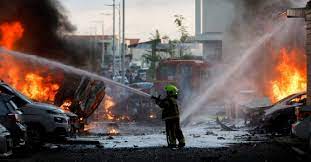By Ben Kerrigan –
Israel’s Prime Minister, Benjamin Netanyahu, declared that the country is now “at war” following a major escalation in the long-running conflict between Israel and Palestine.
The announcement follows an unprecedented attack by Palestinian militants in Gaza after they launched a deadly barrage of rockets and sent armed gunmen into Israeli territory, leading to a devastating toll on both sides.
The attack which took place in the early morning hours, has resulted in at least 22 people dead and over 250 injured, according to Israel’s Magen David Adom (MDA) emergency rescue service.
The assault unfolded on a significant date, marking the 50th anniversary of the 1973 War, when Arab states launched an offensive against Israel on Yom Kippur, the holiest day in the Jewish calendar.
Approximately 2,200 rockets were launched from the Gaza Strip into Israel on that fateful Saturday morning.
Concurrently, armed gunmen infiltrated Israeli territory, launching a ground assault in southern Israel. The audacity and coordination of these attacks have left both Israelis and Palestinians in shock.
Hamas, the Palestinian militant movement that governs Gaza, claimed responsibility for the attack. Their operation, dubbed “Al-Aqsa Storm,” was a calculated response to a series of provocations and grievances.
Muhammad Al-Deif, the leader of Hamas’s military wing, stated in a recorded message that the group had targeted enemy positions, airports, and military installations with thousands of rockets.
Hamas’s motivations for this escalation include their claims of ongoing attacks on women, the desecration of the al-Aqsa mosque in Jerusalem, and the enduring siege of Gaza.
While these claims are disputed by Israel, they reflect the deeply rooted issues that have plagued the Israeli-Palestinian conflict for decades.
In response to the attack, the Israel Defense Forces (IDF) launched strikes against several Hamas targets in Gaza.
Furthermore, they issued a call-up of thousands of reservists, indicating their readiness for a prolonged confrontation.
IDF spokesman Lt Col Richard Hecht confirmed that Israeli forces are currently engaged in ground operations in multiple locations.
The situation is fluid, and while both sides have expressed a desire for victory, it’s essential to consider the potential for further escalation.
Factors such as international pressure, the involvement of regional powers, and the resolve of the parties involved is expected to play a crucial role in determining the conflict’s trajectory.
The Israeli-Palestinian conflict has a long and complex history, marked by deep-seated divisions and partisan support on both sides. It is crucial to understand that this recent escalation is not an isolated incident but rather a manifestation of decades of unresolved disputes and competing narratives.
The conflict’s root causes include issues such as borders, refugees, the status of Jerusalem, and the right to self-determination.
These disputes have defied countless attempts at resolution, including various peace processes and negotiations.
While some of the resolutions have found common ground, the fundamental issues have remained unresolved, perpetuating the cycle of violence.
The potential for further escalation remains of great concern.
That potential depends on various factors, including the willingness of both parties to engage in dialogue, the effectiveness of international diplomatic efforts, and the pressure exerted by regional powers.
Hypothetically, if the conflict continues without intervention, the human toll and devastation could be catastrophic.




